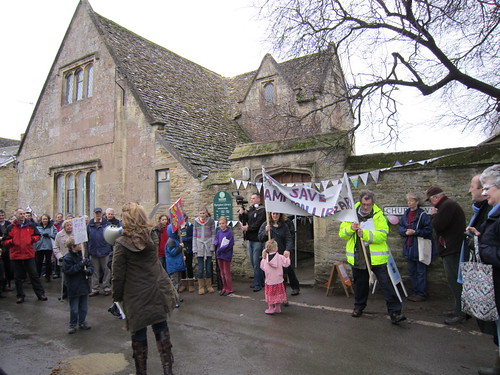Aus aktuellem Anlass: Zwei Videos zum gestrigen “Save Our Libraries Day”
Gestern fand in Großbritannien der “Save your libraries day” statt. Vor manchen Bibliotheken sah es tatsächlich wie auf dem folgenden Retrobild von Phil Bradley aus. In der Bibliothek in Bampton (siehe Foto) und in vielen anderen wurden sogenannte “Read-Ins” verstanstaltet. Dabei handelt es sich um öffentlichkeitswirksame Proteste, bei denen beispielsweise junge NutzerInnen die Regale leer räumten, um Solidarität zu zeigen. Das “Chartered Institute of Library and Information Professionals” rief die UnterstützerInnen zu folgenden Aktionen auf:
- “Got less than 2 minutes? Tweet why you love libraries using the hashtag #savelibrariesPost this page to your Facebook profile and spread the word
- Got 2 minutes? Visit your library website to download an ebook or use online reference resources.
- 5– 10 minutes? Contact all your friends and family, ask them to join their library and use library services on the 5th. Search and reserve books through this guide to library services in England.
- 10 – 15 minutes? Email or write to your local MP, local press or Secretary of State for Culture, Media and Sport about the unique contribution public libraries make to society.
- 15 – 30 minutes? Pop down your local library on the 5th. Borrow as many books as you can. While you are there read a newspaper, go online and find out what’s happening in your local community.”
Die britische Zeitung “The Guardian” hatte vor einigen Tagen eine geographische Karte veröffentlicht. Sie bildet die von Schließungen bedrohten Bibliotheken landesweit ab und zeigt an, wo überall Aktionen stattfanden. Folgende Aktionen wurden gestern durchgeführt:
- Love your Library
- “normale” Proteste
- Autorenlesungen
- Öffentliche Kundgebungen
- Poetry Day
Am häufigsten wurden Proteste abgehalten. Insgesamt geht es um die Schließung von etwa 450 Bibliotheken. Betroffen sind nach wie vor öffentliche Bibliotheken in den Grafschaften Suffolk, South Yorkshire, Sommerset, Oxfordshire, Gloucestershire, Cornwall, Essex, Dorset, Gloucestershire und Buckinghamshire und Cambridgeshire. Genauere und ausführlichere Informationen befinden sich auf der Webseite des Guardian, auf der Internetseiten “Voices for the Library” und das Weblog von Alan Gibbons ist auch sehr informativ. Des Weiteren kommen folgende Städte, die zum Metropolregionen zählen bzw. Stadtteilbibliotheken sind, hinzu: Bolton, London (mehrere Stadtteilbibliotheken betroffen), Edinburgh
In dem folgenden Video sind die EinwohnerInnen von Milborne zu sehen, wie sie gegen die Sparpläne und die mögliche Schließung mobil machen:
